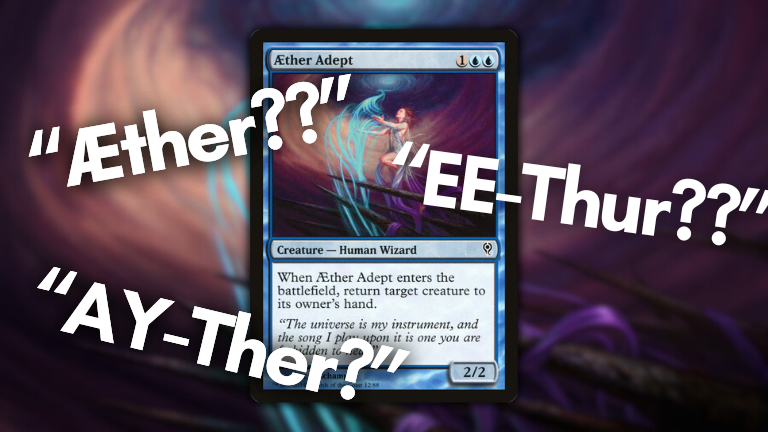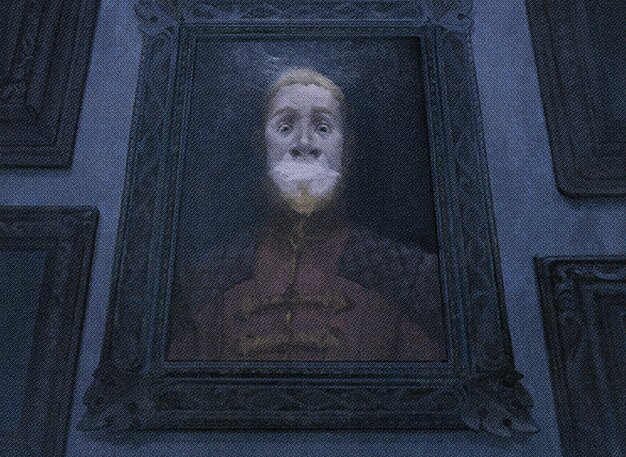Ten Magic Cards You're Pronouncing Wrong

Listen, English is hard. Half the words aren't even English.
It's no surprise that for a game like Magic: The Gathering so reliant on words to convey game actions and flavor, some of those words have been mispronounced, and I'm not talking about all the made-up words in the game like "Garruk (which rhymes with Derek)," "Stromkirk," or "Dr. Julius Jumblemorph," I'm talking about regular, everyday words. We could go on forever about how to pronounce proper nouns in the Magic multiverse since, for many of them, there isn't a precise guide. But I will say that, when it comes to "Myr", it's "MEER," not "MURR."
Instead, we're going to go over some of the more notoriously mispronounced, but actual real English, words in Magic. If you're guilty of saying any of these incorrectly, don't fret. That's no indictment on your ability to communicate through the English language. Just go over to your neighborhood's discussion group on Facebook to see otherwise intelligent people do interesting and unexpected things with the written word.
And I'm no expert in saying words good either: while I went to college about words, and do words for a living, I'm not infallible. I called it "cackling doom
As a note before we go on, these pronunciations are based in good ol' American English (Midwest variety), so if you disagree, please describe why. We're all here to learn.
Phthisis
Phthisis is a real word that's technically English, though it's English in the same way that Lymphangioleiomyomatosis is technically English. Phthisis is an archaic term once used to describe tuberculosis, and before that it was used as a name for a Greco-Roman demon who personified putrefaction, so as a word, it's been around for awhile, translated to "wasting away." As a Magic card, it's a term that fits the bill in terms of the card's art and function.
But in this case, it's an example of the loremasters at Wizards of the Coast going a little too hard into the dictionary to find yet another term for "black removal spell about decay." As for actually pronouncing "phthisis" correctly, just ignore that "ph" at the beginning, and say "THIGH-sis." There will be some people who try to correct you into saying "TIE-sis," but those people can't just disregard every consonant and get away with it.
Nacatl Savage
It's actually pronounced "suh-VEEG," like "Macro Man Randy Suh-VEEG."
Just kidding. We all know how to say "savage." It's the other word, "nacatl," that trips people up. It's coming up again, thanks to Modern Horizons 3's Ajani, Nacatl Pariah
To say the word correctly, you just have to be aware of the Nahua people and their language, which is a natural assumption for game designers to make regarding their playerbase. The language, Nahuatl, is today spoken by a few million people largely residing in Mexico, and it draws its roots from the primary language of the Aztec, and as such is also simply referred to as "Aztec." In Nahuatl, the word "nacatl" meats "meat."
To pronounce it as correctly as we English speakers can, say "nah-CAT-ul." Why WotC pulled the term and applied it to a species of anthropomorphic felines is a question only they can answer (starting with Wild Nacatl
Frontier Bivouac
Frontier Bivouac, and its ambulatory cousin, the Restless Bivouac
If you're an outdoorsy kind of person, "bivouac" isn't tricky at all. A "bivouac" is simply a temporary tent shelter for camping, usually large enough only for one person to sleep within. The act of resting during a mountaineering expedition with such a shelter is called "bivouacking," which is just a fun word to type and say.
We get the word "bivouac" from our friends the French, who themselves borrowed it (with no discernible intention to give it back) from the 1700s Swiss German "Beiwacht," meaning to patrol at an encampment, and was a word used to denote their version of a civilian's neighborhood watch. To properly pronounce it, say "BIV-oo-ak." It's also acceptable to say "BIV-wak." And if you're cool or British, just say "bivvy."
Bivouac is also a clothing store in Ann Arbor, Michigan, but that might not be relevant to everyone reading this.
Omniscience
We've all said "omni science" before as a goof, but all goofs are rooted in unironic earnesty, and there are those among us who might be surprised to hear that "omniscience" is not pronounced "omni science."
It's "om-NISH-ince," and it means the state of knowing all things. Broken down, "omni-" means "all," and "science" means "knowledge." It's Latin in origin, as many of our English words are. Specifically, the -science part has had a few historical stops on the etymological trainline, with the Latin "scio" meaning "to know" and "sciens" meaning "knowing," which are the same word in different cases. Then it was applied in Middle English somewhere in the 11th century as "-cience" before ending at the terminus of modern day.
Basically, you can go ahead and keep saying "omni science," but make sure if you do so, you do it with a wink.
Pithing Needle
We don't see Pithing Needle in Commander much, unless you really, really hate a friend's commander and want to neutralize it specifically, but in other formats, it used to be ubiquitous, especially in sideboards against certain strategies.
Because of this usage, it wasn't unusual to overhear players at tournaments casting "PIE-thing" Needle. As in, "'What's that circular, roughly one-inch deep pan used for?' 'Oh that, I dunno, it's a pie thing.'" But it's not a pie thing, it's a pith-ing.
Pithing, you might be surprised to learn, is a real act and pretty much describes what you would expect from the various arts the card has seen over the years. Not to get too into the details, it's a way to stun or kill something by damaging its brain, kind of like a lobotomy. Frequently, pithing is done with a needle; hence "pithing needle."
No matter how you slice it, it's definitely not related to pie.
Oubliette
This one's a fun one, since there was a whopping 27 years between its debut in Arabian Nights in 1993 and its first reprint in 2020's Double Masters. That's a period of time longer than many Magic players are old. But the word itself is much, much older than even that, and it's been routinely mispronounced by more than just mono-black players seeking to phase out a pesky creature.
An oubliette, by definition, is essentially a dark hole in which you toss a malcontent, only accessible via a tiny hatch usually much higher than the hole is deep. Think of it like a well, but instead of water it's full of 14th century French dissidents. And speaking of French, that's the word's origin language, as its root "-oublier" means "to forget."
It's been heard around games of Magic to be pronounced "Oh-BLEE-it," or "AW-blee-et," or even "ew-BLEET." That's what taking a word from a language like French, with all of its vowels, will do to you. To speak true, say "oo-blee-ET," else you may end up inside a pit in the backyard of a Québécois.
Ichor Wellspring
Here's another tricky Greek-derived word that trips people up. More often than not, you've probably heard (or said yourself) the word "ichor" pronounced "ICK-ur."
But when it comes to cards like Drown in Ichor
As mentioned, ichor is a word borrowed from ancient Greek, though how it got there is a bit of a mystery. For them, it described the golden blood of gods and titans, and later, it was used to describe a much less flowery excretion, namely a pus-like discharge from an open wound suffered by a mere mortal.
And as a fun bonus fact, the word to describe the scent of freshly fallen rain is "petrichor." And before you ask, yes, it's "pet-REYE-kor."
Healing Salve
Not too many people are casting Healing Salve these days. It was part of one of the first ever cycles in Magic, along with equally powerful Giant Growth
It's also strangely enough the only card in Magic with the word "salve" in the name, which describes a sort of gooey ointment for wounds. Not like ichor, which comes out of the wounds, but instead a salve goes on top of it. Gooey in, gooey out, that's what grandma used to say. Since it's the only card with the word "salve" and never sees play, Magic players might not know that it's actually pronounced "SAV," with a silent L.
Benefactor's Draught
Going from one card that never needs another reprint to one that desperately needs its first, we go to Commander 2016's Benefactor's Draught. There's no reason that this card should be $15, but this isn't a Reprint Review, it's a say-words-good review.
Green players who have cast this card have probably done so with a "gotcha" expression on their mug, since it's a pretty tricky card especially if you cast it to save the life of another player. And it's likely that many of them followed up a declaration of attack from an opponent with "I have a response; I cast Benefactor's 'DRAUT.'"
If you're British, you probably had no idea people were saying this one incorrectly, as you're used to the word "draft" spelled as "draught." But that's not a thing here in the USA. In the case of the card itself, it's describing a sort of potion or concoction with healing properties (but not a salve, you don't drink salves). Really though, it can describe any sort of drinkable liquid, even draught beer.
Any card with "Æther"
In English, we read from left to right, and unless you're innately familiar with the word you're reading, you likely sound it out from left to right as well. So for a word with "ae," your first instinct is to say "ay," not "ee." But when it comes to appearances of cards with the word "aether" or "æther" in Magic, it's always "EE-thur" and never "AY-thur."
If it helps, aether is just a less common (read: fancy) way of spelling the word "ether." In the context of the game, it's used to describe the cream filling of the Blind Eternities. From Magic's beginning, all the way up to Kaladesh which features the stuff prominently, the word was stylized with the smushed-together Æ (also known as a ligature), but after that, it was just written as "AE." The issue can best be described by simply showing you this card:
Modern English doesn't use ligatures, like æ, but Old English certainly did, especially when it came to names. When it comes to Magic, the ligature was murdered by Mark Rosewater.

When he reached the entrance of the cavern, he pronounced the words
There we go, ten cards that are often misspoken. Are you guilty of any?
It's likely that among your friends or at your LGS, you've heard equally egregious mispronunciations, and I'd love to learn about them. There are plenty of tricky words left over for further entries into this list.
Hit me with it in the comments!